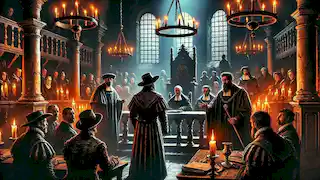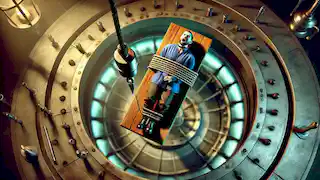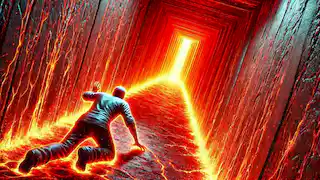The Pit and the Pendulum
Reading time: 13 min

About this story: The Pit and the Pendulum is a Historical Fiction from Spain set in the Renaissance This Dramatic tale explores themes of Perseverance and is suitable for Adults. It offers Entertaining insights. A harrowing tale of survival and resilience during the Spanish Inquisition.
Chapter 1: The Sentence
I was sick—sick unto death with that long agony; and when they at length unbound me, and I was permitted to sit, I felt that my senses were leaving me. The sentence—the dread sentence of death—was the last distinct accentuation which reached my ears. After that, the sound of the inquisitorial voices seemed merged in one dreamy indeterminate hum. It conveyed to my soul the idea of revolution—perhaps from its association in fancy with the burr of a mill-wheel. This only for a brief period; for presently I heard no more. Yet, for a while, I saw; but with how terrible an exaggeration! I saw the lips of the black-robed judges. They appeared to me white—whiter than the sheet upon which I trace these words—and thin even to grotesqueness; thin with the intensity of their expression of firmness—of immovable resolution—of stern contempt of human torture. I saw that the decrees of what to me was Fate, were still issuing from those lips. I saw them writhe with a deadly locution. I saw them fashion the syllables of my name; and I shuddered because no sound succeeded. I saw, too, for a few moments of delirious horror, the soft and nearly imperceptible waving of the sable draperies which enwrapped the walls of the apartment. And then my vision fell upon the seven tall candles upon the table. At first, they wore the aspect of charity, and seemed white slender angels who would save me; but then, all at once, there came a most deadly nausea over my spirit, and I felt every fibre in my frame thrill as if I had touched the wire of a galvanic battery, while the angel forms became meaningless spectres, with heads of flame, and I saw that from them there would be no help. And then there stole into my fancy, like a rich musical note, the thought of what sweet rest there must be in the grave. The thought came gently and stealthily, and it seemed long before it attained full appreciation; but just as my spirit came at length properly to feel and entertain it, the figures of the judges vanished, as if magically, from before me; the tall candles sank into nothingness; their flames went out utterly; the blackness of darkness supervened; all sensations appeared swallowed up in a mad rushing descent as of the soul into Hades. Then silence, and stillness, night was the universe.
Chapter 2: The Chamber
I had swooned; but still will not say that all of consciousness was lost. What of it there remained I will not attempt to define, or even to describe; yet all was not lost. In the deepest slumber—no! In delirium—no! In a swoon—no! In death—no! even in the grave all is not lost. Else there is no immortality for man. Arousing from the most profound of slumbers, we break the gossamer web of some dream. Yet in a second afterward (so frail may that web have been) we remember not that we have dreamed. In the return to life from the swoon there are two stages: first, that of the sense of mental or spiritual; secondly, that of the sense of physical existence. It seems probable that if, upon reaching the second stage, we could recall the impressions of the first, we should find these impressions eloquent in memories of the gulf beyond. And that gulf is—what? How at least shall we distinguish its shadows from those of the tomb? But if the impressions of what I have termed the first stage are not, at will, recalled, yet, after long interval, do they not come unbidden, while we marvel whence they come? He who has never swooned is not he who finds strange palaces and wildly familiar faces in coals that glow; is not he who beholds floating in mid-air the sad visions that the many may not view; is not he who ponders over the perfume of some novel flower—is not he whose brain grows bewildered with the meaning of some musical cadence which has never before arrested his attention.
Amid frequent and thoughtful endeavors to remember; amid earnest struggles to regather some token of the state of seeming nothingness into which my soul had lapsed, there have been moments when I have dreamed of success; there have been brief, very brief periods when I have conjured up remembrances which the lucid reason of a later epoch assures me could have reference only to that condition of seeming unconsciousness. These shadows of memory tell, indistinctly, of tall figures that lifted and bore me in silence down—down—still down—till a hideous dizziness oppressed me at the mere idea of the interminableness of the descent. They tell also of a vague horror at my heart, on account of that heart's unnatural stillness. Then comes a sense of sudden motionlessness throughout all things; as if those who bore me (a ghastly train!) had outrun, in their descent, the limits of the limitless, and paused from the wearisomeness of their toil. After this, I call to mind flatness and dampness; and then all is madness—the madness of a memory which busies itself among forbidden things.

Chapter 3: The Pit
Very suddenly there came back to my soul motion and sound—the tumultuous motion of the heart, and, in my ears, the sound of its beating. Then a pause in which all is blank. Then again sound, and motion, and touch—a tingling sensation pervading my frame. Then the mere consciousness of existence, without thought—a condition which lasted long. Then, very suddenly, thought, and shuddering terror, and earnest endeavor to comprehend my true state. Then a strong desire to lapse into insensibility. Then a rushing revival of soul and a successful effort to move. And now a full memory of the trial, of the judges, of the sable draperies, of the sentence, of the sickness, of the swoon. Then entire forgetfulness of all that followed; of all that a later day and much earnestness of endeavor have enabled me vaguely to recall.
So far, I had not opened my eyes. I felt that I lay upon my back, unbound. I reached out my hand, and it fell heavily upon something damp and hard. There I suffered it to remain for many minutes, while I strove to imagine where and what I could be. I longed, yet dared not to employ my vision. I dreaded the first glance at objects around me. It was not that I feared to look upon things horrible, but that I grew aghast lest there should be nothing to see. At length, with a wild desperation at heart, I quickly unclosed my eyes. My worst thoughts, then, were confirmed. The blackness of eternal night encompassed me. I struggled for breath. The intensity of the darkness seemed to oppress and stifle me. The atmosphere was intolerably close. I still lay quietly, and made effort to exercise my reason. I brought to mind the inquisitorial proceedings, and attempted from that point to deduce my real condition. The sentence had passed; and it appeared to me that a very long interval of time had since elapsed. Yet not for a moment did I suppose myself actually dead. Such a supposition, notwithstanding what we read in fiction, is altogether inconsistent with real existence; but where and in what state was I? The condemned to death, I knew, perished usually at the auto-da-fés, and one of these had been held on the very night of the day of my trial. Had I been remanded to my dungeon, to await the next sacrifice, which would not take place for many months? This I at once saw could not be. Victims had been in immediate demand. Moreover, my dungeon, as well as all the condemned cells at Toledo, had stone floors, and light was not altogether excluded.
Suddenly I heard the deep breath of someone close beside me. A hand was pressed firmly to my mouth, and a voice whispered in my ear.
"Silence, for the love of God! Do you want them to hear you?"
The grip on my mouth loosened, and I gasped for air. Before I could utter a sound, the hand returned, this time in a more calming manner.
"You must be quiet," the voice continued. "We are in the Inquisition's deepest cell. They have ways to hear even our whispers."
Chapter 4: The Discovery
Slowly, I realized I was not alone. The darkness made it impossible to see my companion, but the warmth of his hand and the urgency of his whisper confirmed his presence. My mind raced with questions, but I knew to remain silent. Instead, I focused on the faint sounds around us. The slow dripping of water, the distant echo of footsteps, and the ever-present sound of my own heartbeat.
Hours, or perhaps days, passed in this way. My companion, whom I later learned was a fellow prisoner named Fernando, provided brief, whispered updates when he was sure it was safe. He had been in the cell for months, waiting for an opportunity to escape. The pit in the center of the chamber was a well-known method of execution by the Inquisition, and Fernando had seen many prisoners succumb to its horrors.
"We must find a way out," Fernando whispered one night. "I've been observing the guards' routines. There's a small window of opportunity when the shifts change. If we can time it right, we might have a chance."
I nodded, though I knew he could not see me. The thought of escape filled me with a renewed sense of hope and determination.
Chapter 5: The Pendulum
Our opportunity came sooner than expected. One night, the usual guards did not come, and the chamber remained eerily silent. Fernando and I decided to act. We felt our way along the damp walls, searching for any sign of an exit. After what felt like an eternity, we found a narrow passage that seemed to lead upward. It was barely wide enough for a man to crawl through, but it was our only hope.
We moved slowly and cautiously, aware that any sound could alert the guards. The passage was dark and suffocating, but we pressed on. At last, we emerged into a small, dimly lit room. It was then that we realized we had not escaped the Inquisition's grasp. The room contained a large wooden platform, and above it, a massive pendulum with a razor-sharp blade.
"This is the pendulum they use for torture," Fernando whispered. "We must be careful."
As we examined the room, we noticed the pendulum was motionless, but we could hear the faint ticking of a clockwork mechanism. It was only a matter of time before it would activate. We needed to find a way out before that happened.

Chapter 6: The Escape
Fernando and I searched the room frantically. We found a set of rusty keys hanging on the wall, and Fernando tried each one on the heavy wooden door. Finally, one of the keys turned, and the door creaked open. We stepped into a narrow corridor, barely wide enough for us to walk side by side.
The corridor led to a series of twists and turns, and we struggled to maintain our sense of direction. The air grew colder, and we heard the distant sounds of the Inquisition's torturous devices. We knew we had to be close to the surface.
As we rounded a corner, we came face to face with a guard. He looked as surprised as we were, and for a moment, we all stood frozen. Then Fernando lunged at the guard, tackling him to the ground. The guard's weapon clattered to the floor, and I grabbed it, holding it ready.
"Go!" Fernando shouted. "I'll hold him off!"
I hesitated, but Fernando's determination gave me the strength to continue. I ran down the corridor, following the faint light at the end. As I burst through a door, I found myself in a courtyard, bathed in moonlight. The cool night air was a stark contrast to the stifling dungeon, and I breathed deeply, savoring my first taste of freedom.
Chapter 7: The Rescue
My relief was short-lived. Shouts and the sound of footsteps echoed through the courtyard. I knew I had to keep moving. I scaled the stone wall, using the rough surface to find footholds. As I reached the top, I saw a group of soldiers approaching. Desperation drove me to leap to the ground below, where I landed hard but unhurt.
I fled through the dark streets of Toledo, dodging patrols and hiding in shadows. The city's labyrinthine layout worked to my advantage, and I finally reached the outskirts, where the French army had set up camp.
Exhausted and breathless, I stumbled into the camp, where I was met by the French soldiers. They listened to my story and provided me with food, water, and shelter. It was there that I learned of their plans to storm the Inquisition's fortress and end its reign of terror.

Chapter 8: The Final Confrontation
The next morning, I accompanied the French soldiers back to the fortress. The battle was fierce, with both sides fighting desperately. The French, fueled by their desire to liberate the prisoners and end the Inquisition's brutality, pressed on despite heavy losses.
As we fought our way through the fortress, I found myself in the chamber where Fernando had sacrificed himself. The pendulum still hung ominously above the platform, but it was motionless. I knew I had to find Fernando, if he was still alive.
With the help of the French soldiers, I navigated the labyrinthine corridors until we found the dungeon where Fernando was being held. He was alive, though badly wounded. We carried him out of the fortress and back to the French camp, where he received medical attention.
Chapter 9: The Aftermath
With the fortress captured and the Inquisition's hold on the city broken, the survivors began to rebuild their lives. Fernando and I were among those who had endured the worst of the Inquisition's horrors, but we found solace in knowing that we had survived and played a part in its downfall.
In the months that followed, we worked to help other survivors and rebuild the city. The memory of the pit and the pendulum, the dark chamber, and the ever-present threat of death remained with us, but we found strength in each other and in the knowledge that we had triumphed over evil.
Chapter 10: A New Beginning
As the city of Toledo began to heal, Fernando and I continued to work together, helping to establish a new order based on justice and compassion. We knew that the scars of the past would never fully fade, but we were determined to create a better future for ourselves and for those who had suffered alongside us.
In time, the story of the pit and the pendulum became a symbol of resilience and perseverance. It was a reminder that even in the darkest of times, the human spirit could endure and triumph over adversity. And as we looked toward the future, we carried with us the lessons we had learned and the strength we had gained from our harrowing ordeal.


















